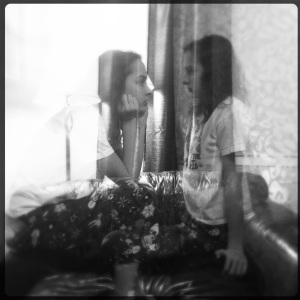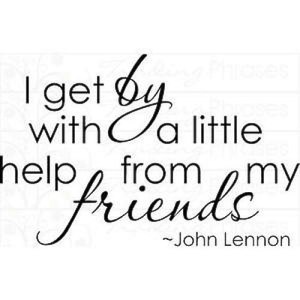Here in suburbia, it’s not always the land of picket fences, two car garages and expansive green lawns. People need help. And I mean all kinds of people. For us, the requests from our daughter’s elementary school have been coming in at a fairly rapid clip. Licorice sales, nights of childcare, read-a-thon, jog-a-thon and every other imaginable a-thon. When I was growing up, hell, the shit was fully funded. Not now. And it’s not just schools, it’s every other social service organization that’s been forced to cut its budget. But you know what? Your friend, the one who’s getting divorced with three kids? She needs help, too. Lots of it. Only she’s not asking.
Why does it seem like the ones who need it the most are the least likely to ask for help? Could be a whole host of reasons, such as fear of judgment by others, of losing the perception of being “strong” or “independent,” or maybe they just don’t want to feel like they would somehow owe you. In a recent study done by the Fetzer Institute on the neuroscience of love, compassion and forgiveness, it was found that as we experience fear, our capacity for trust diminishes. When we need to trust other people in times of need, that pesky little amygdala is activated, causing us to hesitate, to hedge our bets. It might be safer to not ask for help, because we might lose our standing as the one who always gets it done. We might be perceived as having a crack in our armor. In our society, there’s not much worse than that.
A dear friend of mine once told me that the only real friends you have are the ones you can call to help you move. Having moved more times than a vagabond, I can honestly say this is true. Maybe it’s not a move. Maybe you found out your husband is cheating on you. Maybe you screamed at your kids. Maybe you want to leave your job. Any time you need help with something that seems huge and overwhelming, you want someone who:
- shows up. Does what they say they will do. Plain and simple.
- will not string you along, as in, “I might be available, I’m not sure, I’ll let you know.”
- will not be disappointed that you may, in fact, fuck up sometimes. So maybe not, like, your dad.
- is not uncomfortable with someone asking for help, for example, someone who would NEVER ask for help.
- is honest and will hold a mirror up to your imperfections. And you let them.
- won’t try and out-misery your misery. That’s the worst. It’s hard enough to ask, right?
- is not a blabbermouth. You know who.
- is not the person who gives and gives and gives and never lets you give back. Then you feel like a user.
- just gets it. That’s all.
Here’s the thing too. People want to help! In a study published last year at the University of Oregon, people’s “feel-good” areas of the brain lit up when they engaged in charitable giving. Structures such as the ventral striatum and parts of the frontal cortex became more active, just as much as if they themselves had received a check. But, as any charitable organization knows, it all rides on the ask. How do you ask for help, anyway?
It doesn’t matter if you are asking for a thousand dollars or a ride home for your daughter. Tough to do, either way. The danger, however, is that your stalling will cause your problem to snowball into a full blown avalanche. It’s hard not to be freakish and panicky when you ask someone to watch your kids the next day because it’s, well, the next fucking day. What would have been a lot easier to do a week ago is now incredibly difficult. Keeping it simple. Women, it seems, are particularly guilty of this. We give too much background information, seeking pity, when what we truly need is some damn help!
When I think about the things that bring me the most satisfaction and joy, it’s the ways I connect to my friends and my family. And that often means helping them in small, seemingly meaningless ways. But I know how it feels to have someone really have my back and do something for me that, although small, felt absolutely essential at the time. My mom putting a cold compress on my forehead when I had a fever. My husband forwarding me a useful article. My friend bringing me a cold 7-Up when I was hot and dehydrated. You know how it feels to receive the sweet embrace of a loving gesture. A gesture so filled with meaning that “thank you” seems a meek and hopelessly inadequate phrase. But say it anyway. It’s enough.
Compassion is more than fundamentally human, it may even be a life extender. Michael Poulin of the University of Buffalo is doing research now that says that compassion decreases your stress hormones, which lead your chemistry to go haywire and result in inflammation and all kinds of bad mojo churning in your body. What’s important is offering help to someone you care about, so comforting your colleague who loses her job is more important than volunteering at a shelter or someone else where you are not emotionally invested.
So, the next time you need some help, don’t be afraid to ask for it. Think of it this way: you are giving your friend or neighbor the opportunity to extend their lives and reduce their stress! How great a friend are you! I mean, you would do the same for them.
When’s the last time you asked for help?
Many thanks as always to Barbara Paulsen of Mt. Hood Mama photos. I asked for her help. I knew she would.





